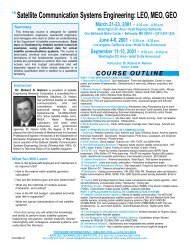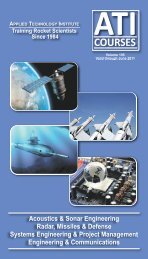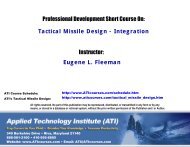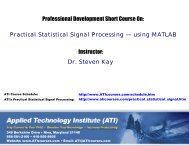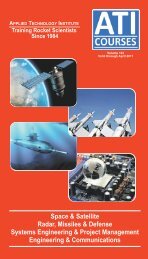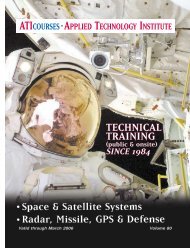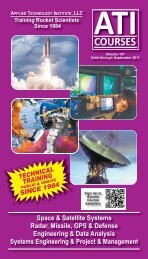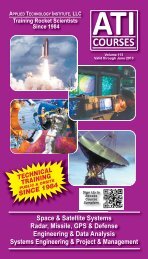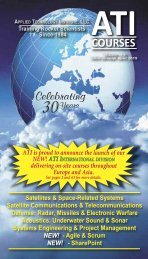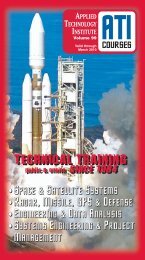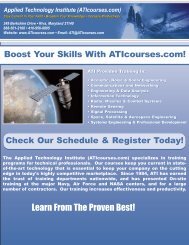Systems Engineering - ATI
Systems Engineering - ATI
Systems Engineering - ATI
You also want an ePaper? Increase the reach of your titles
YUMPU automatically turns print PDFs into web optimized ePapers that Google loves.
Spacecraft Thermal Control<br />
March 2-3, 2011<br />
Beltsville, Maryland<br />
$990 (8:30am - 4:00pm)<br />
"Register 3 or More & Receive $100 00 each<br />
Off The Course Tuition."<br />
Summary<br />
This is a fast paced two-day course for system<br />
engineers and managers with an interest in improving<br />
their understanding of spacecraft thermal design. All<br />
phases of thermal design analysis are covered in<br />
enough depth to give a deeper understanding of the<br />
design process and of the materials used in thermal<br />
design. Program managers and systems engineers will<br />
also benefit from the bigger picture information and<br />
tradeoff issues.<br />
The goal is to have the student come away from this<br />
course with an understanding of how analysis, design,<br />
thermal devices, thermal testing and the interactions of<br />
thermal design with the overall system design fit into<br />
the overall picture of satellite design. Case studies and<br />
lessons learned illustrate the importance of thermal<br />
design and the current state of the art.<br />
Instructor<br />
Douglas Mehoke is the Assistant Group Supervisor<br />
and Technology Manager for the Mechanical System<br />
Group in the Space Department at The Johns Hopkins<br />
University Applied Physics Laboratory. He has worked<br />
in the field of spacecraft and instrument thermal design<br />
for 30 years, and has a wide background in the fields<br />
of heat transfer and fluid mechanics. He has been the<br />
lead thermal engineer on a variety spacecraft and<br />
scientific instruments, including MSX, CONTOUR, and<br />
New Horizons. He is presently the Technical Lead for<br />
the development of the Solar Probe Plus Thermal<br />
Protection System.<br />
What You Will Learn<br />
• How requirements are defined.<br />
• Why thermal design cannot be purchased off the<br />
shelf.<br />
• How to test thermal systems.<br />
• Basic conduction and radiation analysis.<br />
• Overall thermal analysis methods.<br />
• Computer calculations for thermal design.<br />
• How to choose thermal control surfaces.<br />
• When to use active devices.<br />
• How the thermal system interacts with other<br />
systems.<br />
• How to apply thermal devices.<br />
Course Outline<br />
1. The Role of Thermal Control. Requirements,<br />
Constraints, Regimes of thermal control.<br />
2. The basics of Thermal Analysis, conduction,<br />
radiation, Energy balance, Numerical analysis, The<br />
solar spectrum.<br />
3. Overall Thermal Analysis. Orbital mechanics<br />
for thermal engineers, Basic orbital energy balance.<br />
4. Model Building. How to choose the nodal<br />
structure, how to calculate the conductors capacitors<br />
and Radfacs, Use of the computer.<br />
5. System Interactions. Power, Attitude and<br />
Thermal system interactions, other system<br />
considerations.<br />
6. Thermal Control Surfaces. Availability, Factors<br />
in choosing, Stability, Environmental factors.<br />
7. Thermal control Devices. Heatpipes, MLI,<br />
Louvers, Heaters, Phase change devices, Radiators,<br />
Cryogenic devices.<br />
8. Thermal Design Procedure. Basic design<br />
procedure, Choosing radiator locations, When to use<br />
heat pipes, When to use louvers, Where to use MLI,<br />
When to use Phase change, When to use heaters.<br />
9. Thermal Testing. Thermal requirements, basic<br />
analysis techniques, the thermal design process,<br />
thermal control materials and devices, and thermal<br />
vacuum testing.<br />
10. Case Studies. The key topics and tradeoffs are<br />
illustrated by case studies for actual spacecraft and<br />
satellite thermal designs. <strong>Systems</strong> engineering<br />
implications.<br />
Register online at www.<strong>ATI</strong>courses.com or call <strong>ATI</strong> at 888.501.2100 or 410.956.8805 Vol. 104 – 61



